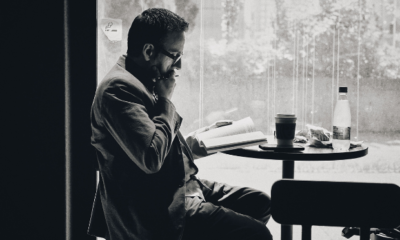Life
3 Tactics Ordinary Citizens Used To Out Predict CIA Experts
In the intelligence community, it’s crucial to be able to predict future events. The ability for the CIA and its intelligence counterparts to be able to forecast world events based on limited information is what gives us advantages on the international stage.
In a recent interview on The Science of Success Podcast, New York Times best-selling author Dan Gardner shares the incredible story of how a group of citizen volunteers led by Philip Tetlock, changed the way our intelligence communities’ approach analyzing and forecasting future political events.
It all started in 2011. The Office of the Director of National Intelligence (ODNI) decided it was time to evaluate and improve on how The United States’ 16 intelligence agencies forecast future events. The idea was to analyze these agencies past predictions and find ways to learn from previous mistakes.
“The intelligence community actually spends a lot of its time not just spying, but also analyzing information to try and figure out what’s going to happen next. Will Russia try to seize the Crimea? They’ll try to make forecasts. On all parts of geopolitical events, including economic events like what’s going to happen at the Chinese economy in the fourth quarter, that sort of thing.”
So in order to gain perspective the intelligence community agreed to fund a number of private researches to assemble teams of unpaid volunteers to take their best shot at it. “You set up a team to make forecasts, and we’ll ask questions, and they’ll be the real world questions that we have to answer all the time.” Gardner explains.
Ultimately they came up with five university based research teams for this tournament. One of which was headed up by Gardner’s co-author, Philip Tetlock. They decided to name their team The Good Judgment Project. The Project successfully recruited thousands of volunteers. The ODNI set several benchmarks that all of the researchers thought we’re much too ambitious. “Prior to beginning the project, looking at these benchmarks, nobody could do this!”
The results were beyond surprising. Certain volunteers blew away each benchmark and predicted future events with incredible accuracy. “The Good Judgment Project won hands down. They found that a certain group of these volunteers were consistently good at forecasting these events. Anyone can get lucky once, twice, maybe three times. These volunteers however were consistent, and that is key.”
These “Superforecasters” were normal people, with average IQ scores, no previous intelligence community experience, and zero access to classified information. Each of these volunteers had a common interest in world events and stayed up to date on their world politics, but had nothing else you or I couldn’t find ourselves on Google. Yet they were making predictions that economists said should have been impossible.
So how did they do it? Dan points out three things the researchers from The Good Judgment Project found these volunteers had in common.
1. Unpack Your Problems
Many of us look at a problem as one thing. We are presented with the issue, we look it over, stroke our chins, and then try to solve. However, looking at the problem or question as one big issue will lead to terrible predictions.
“What they do is that they methodically unpack the question. They take a big question, and they unpack it, and make a whole series of smaller questions, and then they unpack those and they make a series of smaller questions, and they methodically examine them.”
You’re taking one complex problem, breaking it down into its smaller, simpler components. Allowing you to answer these simpler questions and ultimately piece them back together to create an extremely accurate and effective answer to a larger problem.
“If you’re overwhelmed by the size of a problem, break it down into smaller pieces.” – Chuck Close
2. Craving Cognition
Each of these “superforecasters” had a desire to be intellectually challenged and learn. “These are people who like to learn, they’re constantly picking up bits and pieces of information, and no surprise, when you spend a lot of time picking up this sort of information, eventually you will have quite a number of dots in your intellectual arsenal for you to connect.”
Also, each volunteer enjoyed pushing himself or herself mentally. “They’re the kinds of people who do puzzles for fun and the harder the puzzle is, the more fun it is,” explains Gardner.
So next time you decide to do some recreational problem solving whether it be a puzzle or mental game, crank the difficulty up a little bit and give your brain a challenge.
3. It’s All About Your Mindset
Each “superforecaster” volunteer was extremely open to hearing other’s opinions. “This means okay, I’ve got my perspective but I want to hear your perspective. I want to hear somebody else’s perspective. I want to hear different ways of thinking about this problem.”
By listening to as many other opinions as possible, these volunteers were able to then synthesize ideas from multiple sources and viewpoints and create the most well rounded and analyzed prediction possible.
It’s easy to want to take all the credit, to finish first, and be the star of the show. We all have the impulse to think we’ve done our due diligence and our viewpoint is the right one. It’s only through keeping an open mind to other viewpoints and outside information that we can truly begin to consistently make better predictions and decisions.
“Once your mindset changes, everything on the outside will change along with it.” – Steve Maraboli
The Good Judgment Project is still being conducted to this day and is open for volunteers. To learn more about the project, forecasting tactics, and Dan’s book Superforecasting, listen to his full hour interview on The Science of Success Podcast.
Which one of these three tactics do you use most? Please leave your thoughts below!
Did You Know
How Skilled Migrants Are Building Successful Careers After Moving Countries
Behind every successful skilled migrant career is a mix of resilience, strategy, and navigating systems built for locals.

Moving to a new country for work is exciting, but it can also be unnerving. Skilled migrants leave behind familiar systems, networks, and support to pursue better job opportunities and a better future for their families. (more…)
Life
10 Research-Backed Steps to Create Real Change This New Year
This New Year could finally be the one where you break old patterns and create real, lasting change.

Every New Year, we make plans and set goals, but often repeat old patterns. (more…)
Life
9 Harsh Truths Every Young Man Must Face to Succeed in the Modern World
Before chasing success, every young man needs to face these 9 brutal realities shaping masculinity in the modern world.

Many young men today quietly battle depression, loneliness, and a sense of confusion about who they’re meant to be.
Some blame the lack of deep friendships or romantic relationships. Others feel lost in a digital world that often labels traditional masculinity as “toxic.”
But the truth is this: becoming a man in the modern age takes more than just surviving. It takes resilience, direction, and a willingness to grow even when no one’s watching.
Success doesn’t arrive by accident or luck. It’s built on discipline, sacrifice, and consistency.
Here are 9 harsh truths every young man should know if he wants to thrive, not just survive, in the digital age.
1. Never Use Your Illness as an Excuse
As Dr. Jordan B. Peterson often says, successful people don’t complain; they act.
Your illness, hardship, or struggle shouldn’t define your limits; it should define your motivation. Rest when you must, but always get back up and keep building your dreams. Motivation doesn’t appear magically. It comes after you take action.
Here are five key lessons I’ve learned from Dr. Peterson:
-
Learn to write clearly; clarity of thought makes you dangerous.
-
Read quality literature in your free time.
-
Nurture a strong relationship with your family.
-
Share your ideas publicly; your voice matters.
-
Become a “monster”, powerful, but disciplined enough to control it.
The best leaders and thinkers are grounded. They welcome criticism, adapt quickly, and keep moving forward no matter what.
2. You Can’t Please Everyone And That’s Okay
You don’t need a crowd of people to feel fulfilled. You need a few friends who genuinely accept you for who you are.
If your circle doesn’t bring out your best, it’s okay to walk away. Solitude can be a powerful teacher. It gives you space to understand what you truly want from life. Remember, successful men aren’t people-pleasers; they’re purpose-driven.
3. You Can Control the Process, Not the Outcome
Especially in creative work, writing, business, or content creation, you control effort, not results.
You might publish two articles a day, but you can’t dictate which one will go viral. Focus on mastery, not metrics. Many great writers toiled for years in obscurity before anyone noticed them. Rejection, criticism, and indifference are all part of the path.
The best creators focus on storytelling, not applause.
4. Rejection Is Never Personal
Rejection doesn’t mean you’re unworthy. It simply means your offer, idea, or timing didn’t align.
Every successful person has faced rejection repeatedly. What separates them is persistence and perspective. They see rejection as feedback, not failure. The faster you learn that truth, the faster you’ll grow.
5. Women Value Comfort and Security
Understanding women requires maturity and empathy.
Through books, lectures, and personal growth, I’ve learned that most women desire a man who is grounded, intelligent, confident, emotionally stable, and consistent. Some want humor, others intellect, but nearly all want to feel safe and supported.
Instead of chasing attention, work on self-improvement. Build competence and confidence, and the rest will follow naturally.
6. There’s No Such Thing as Failure, Only Lessons
A powerful lesson from Neuro-Linguistic Programming: failure only exists when you stop trying.
Every mistake brings data. Every setback builds wisdom. The most successful men aren’t fearless. They’ve simply learned to act despite fear.
Be proud of your scars. They’re proof you were brave enough to try.
7. Public Speaking Is an Art Form
Public speaking is one of the most valuable and underrated skills a man can master.
It’s not about perfection; it’s about connection. The best speakers tell stories, inspire confidence, and make people feel seen. They research deeply, speak honestly, and practice relentlessly.
If you can speak well, you can lead, sell, teach, and inspire. Start small, practice at work, in class, or even in front of a mirror, and watch your confidence skyrocket.
8. Teaching Is Leadership in Disguise
Great teachers are not just knowledgeable. They’re brave, compassionate, and disciplined.
Teaching forces you to articulate what you know, and in doing so, you master it at a deeper level. Whether you’re mentoring a peer, leading a team, or sharing insights online, teaching refines your purpose.
Lifelong learners become lifelong leaders.
9. Study Human Nature to Achieve Your Dreams
One of the toughest lessons to accept: most people are self-interested.
That’s not cynicism, it’s human nature. Understanding this helps you navigate relationships, business, and communication more effectively.
Everyone has a darker side, but successful people learn to channel theirs productively into discipline, creativity, and drive.
Psychology isn’t just theory; it’s a toolkit. Learn how people think, act, and decide, and you’ll know how to lead them, influence them, and even understand yourself better.
Final Thoughts
The digital age offers endless opportunities, but only to those who are willing to take responsibility, confront discomfort, and keep improving.
Becoming a man today means embracing the hard truths most avoid.
Because at the end of the day, success isn’t about luck. It’s about who you become when life tests you the most.
Change Your Mindset
The Four Types of Happiness: Which One Are You Living In?
Most people chase success only to find emptiness, this model reveals why true happiness lies somewhere else.

In a world driven by rapid technological growth and constant competition, many people unknowingly trade joy for achievement. (more…)
-

 News3 weeks ago
News3 weeks agoBrandon Willington Builds 7-Figure Business by Ignoring Almost Everything
-

 Health & Fitness4 weeks ago
Health & Fitness4 weeks agoWhat Minimalism Actually Means for Your Wellness Choices
-

 Did You Know3 weeks ago
Did You Know3 weeks agoWhy Most Online Courses Fail and How to Fix Them
-

 Business3 weeks ago
Business3 weeks agoIf Your Business Internet Keeps Letting You Down, Read This
-

 Business2 weeks ago
Business2 weeks agoEntrepreneur’s Guide to Pay Stubs: Why Freelancers and Small Business Owners Need a Smart Generator
-

 Business2 weeks ago
Business2 weeks agoThe Salary Shift Giving UK Employers An Unexpected Edge
-

 Business2 weeks ago
Business2 weeks agoThe Simple Security Stack Every Online Business Needs
-

 Scale Your Business2 weeks ago
Scale Your Business2 weeks ago5 Real Ways to Grow Your User Base Fast





























